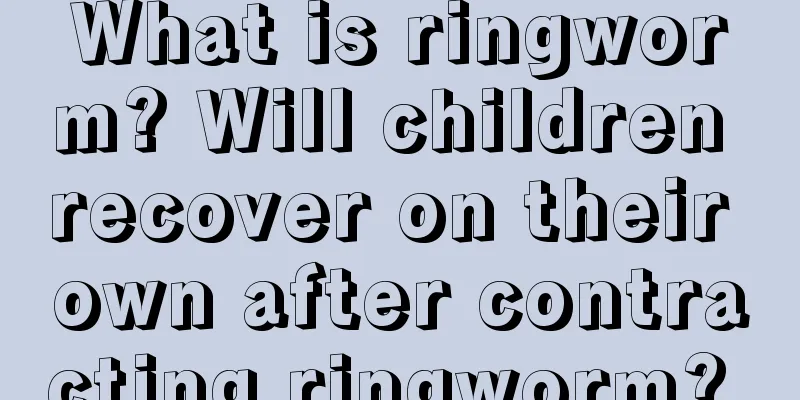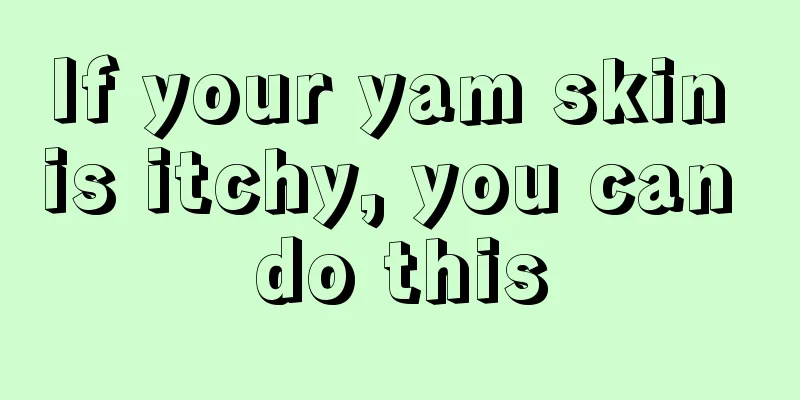What is ringworm? Will children recover on their own after contracting ringworm?

|
Recently, many parents have found that their children's hair on the top of their heads has obvious clefts. They are afraid that it is due to a lack of certain nutrients, so they rush to take their children to see a doctor, but they are told that it is ringworm and the child will heal itself when he reaches puberty. Let's find out what ringworm is! Tinea capitis is also known as Microsporum capitis, which is the most common. The main pathogens are Microsporum canis and Microsporum gypseum, and occasionally Microsporum ferrugineum. The initial lesions are clustered follicular papules, or annular red patches, which then become mainly scales. The remaining hair shafts are grayish white, dry, slightly sparse, and dull. The disease occurs when the hair breaks about 0.3-0.8 cm away from the scalp, and the remaining hair shafts are surrounded by grayish white sheath-like scales, namely "fungal sheaths", which are formed by fungal spores parasitizing on the hair shafts. There is generally no inflammatory reaction, and it may also be slightly red. The hair follicles may bulge like chicken skin, occasionally accompanied by pustules, exudate, scabs, enlarged lymph nodes nearby, and conscious itching. The lesions generally develop and no longer expand or increase after half a year, and are in a relatively static state. They tend to heal themselves in puberty. If there is no secondary infection, no scars are left, and the healed hair can grow completely. It manifests as grayish-white scaly patches, fungal sheaths, and broken hair on the head. Children can recover without treatment when they reach puberty. Clinical manifestations: (1) Typical scalp lesions have three major clinical features: Grayish white scaly patches, sheaths, broken hair. In the early stage, it appears as round grayish white scaly spots, and later many satellite-like small scaly spots appear around them. After expanding, they merge into large pieces with clear boundaries. They often occur on the top and occipital regions. The lesions develop rapidly at first, and enter a dormant period after 3 months. By puberty, due to the vigorous secretion of sebaceous glands, the unsaturated fatty acids produced after the decomposition of sebum have an inhibitory effect on Trichophyton, so they can heal themselves without treatment by puberty. (2) Hair damage The hair loses its luster and often breaks 2 to 4 inches away from the scalp. It is surrounded by a white sheath that is not easy to remove, so the disease is characterized by high infectiousness. The hair is easy to pull out, with slight itching. No scars are left after healing, and hair regenerates normally. |
<<: What to do if your knee hurts when going up and down stairs? Pay attention to these things
>>: Does sleep weight loss really work?
Recommend
Will laser hair removal affect sweating?
There are many hair removal techniques, including...
Why does drinking milk on an empty stomach cause stomach pain in the morning?
Milk is a drink that is deeply loved by people in...
What's wrong with my swollen arm
Swelling in the arms should be taken seriously, a...
How to treat herpes simplex? 3 methods for good targeted treatment effects
Herpes simplex is a disease caused by infection w...
What medicine is better for diabetes insipidus
Patients with diabetes insipidus need timely trea...
Can hepatitis B patients drink red wine?
We all know that alcohol is an indispensable subs...
How to exercise in the early stage of esophageal cancer
At present, the cause of esophageal cancer is not...
What are the dangers of teeth cleaning
Teeth are very important parts of our body. Once ...
What are the specific symptoms of prostate cancer? What are the manifestations of prostate cancer bone metastasis?
Nowadays, people are more concerned about prostat...
How to treat facial swelling caused by toothache
Toothache is something that most people have expe...
What to do if facial skin is itchy?
Most of the itching on the face is caused by alle...
What are some tips for thickening the skin's stratum corneum
If the stratum corneum of the facial skin becomes...
Can I lose weight by starving myself
People who want to lose weight want to have a per...
How to prevent brain cancer
Now that living conditions have improved, many di...
How can I wash off my eyebrow tattoo
Eyebrow tattooing is a cosmetic technique. Some p...









